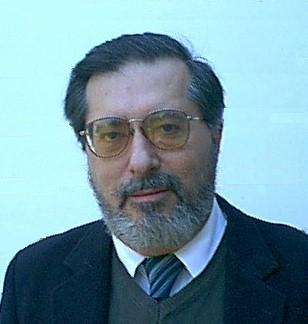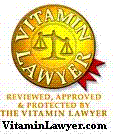Alternative Therapeutic Practices
and the AMA Code of
Ethics
Ralph Fucetola JD - The Vitamin Lawyer
This essay considers the use of the terms “therapy” and
“therapeutic” with reference to alternative health practices. It compares those
terms to the term-of-art, "treatment of disease." Alternative health practices
can be generally defined as traditional or other practices that are used by
individuals, often for self-help, to achieve and maintain a healthy status,
either on their own or complementary to standard medical care.
These practices do not include the potentially dangerous use of invasive
techniques and toxic drugs that are the province of licensed medicine. They do,
however, include developing therapies and nonstandard approaches that are
outside the scope of licensed medicine. These are sometimes referred to as
"Complementary and Alternative Modalities" (CAM).
CAM health
practices can be generally defined as traditional or other practices that are
used by individuals, often for self-help, to achieve and maintain a healthy
status, either on their own or complementary to standard medical care. These
practices do not include the potentially dangerous use of invasive techniques
and toxic drugs that are the sole province of licensed medicine. They do,
however, include developing therapies and nonstandard approaches that are
outside the scope of licensed medicine. Such approaches as Nutrition,
Homeopathy, Hands-on-Healing, Magnetics, Sound Health, Energy Therapies,
Biofeedback, Meditation, Breath Work, Reiki, Chi Gong, Tai Chi and Herbology are
examples of complementary and alternative therapeutic practices. Traditional
Chinese, Ayurvedic medicine or folk remedies and "Dr. Mom" home remedies are
also examples of CAM practices.
These practices aim, in the words of Philip J. Hodes, PhD., at "more efficient
physiological integration and function of the human organism, leading to optimal
wellness."*
The terms “therapy” and “therapeutic” do not occur, for example, in the context
of the Dietary Supplement Health and Education Act of 1994 (DSHEA). Rather, that
statute, passed unanimously by Congress, tells us that Dietary Supplements may
not “diagnose, treat, cure or prevent” any disease. It does not specifically
forbid the use of the word “therapy” (or “therapeutic”). Under the Supreme
Court’s rule in the Thompson v Western Medical case, we should expect that these
words would not be forbidden by the Courts.
Further, the Code of Medical Ethics of the American Medical Association has also
begun to acknowledge an independent use of the term “therapy.” The original
Hippocratic Oath, with its injunction to "Do no harm." has been replaced by a
complex Code detailing the relationship between physician and patient and
alternative practitioner. Changes made during the early 1990's were inspired by
anti-trust lawsuits brought during the 1980's by chiropractors and others. These
changes are just now becoming recognized by regulators and courts.
While "treatment which has no scientific basis" remains condemned (Opinion
3.01), under Opinion 3.04, physicians are free to "refer" a patient "for
therapeutic or diagnostic services to another physician, limited practitioner or
any other provider of health care services permitted by law to furnish such
services, whenever he or she believes that this may benefit the patient." Thus,
unscientific "treatment" is distinguished from "health care services permitted
by law." "Treatment" -- which means the use of standard medicine and surgery to
"cure" disease -- is distinguished from other health care services (therapies)
which need only meet the lesser "may benefit" standard. While
physicians "prescribe" treatments for disease, therapies that may benefit may be
subject to "referral" thereby further indicating the distinction. Thus, for example,
Dietary Supplements that support normal structure and function to support
therapeutic outcomes can be seen to complement licensed medicine, but not to be
held to its strictures, nor limited in its practice to licensed physicians.
Since such therapies are not prescription services, members of the public may
choose such services without the permission of their physician. Purveyors may restrict sale of therapeutic products to
physicians, complementary practitioners, exercise and health care
professionals, although they are not required to do so.
I have analyzed the word “therapy” and the similar word “therapeutic” because
these words are not forbidden by DSHEA and are referenced by the AMA Ethics
Code. I can recommend “Therapeutic Nutritionals” for alternative practices
centered on Nutrition. I recommend the use of the qualifying word, “Nutritional”
in this context to make it completely clear that the practitioner is not
offering treatment of disease.
The claims made for Therapeutic Nutritionals must, of course, be allowed
Structure and Function Claims. Thus, for example, one cannot claim that a
nutrient lowers cholesterol levels – since there is now a “disease” of
hypercholesterolemia – but can claim that a nutrient maintains normal
cholesterol levels for persons with normal cholesterol. A purveyor may say that
a certain combination of multivitamins was designed to maintain normal structure
and function for a person with diabetes, but not that the combination treats
diabetes or affects the blood sugar level. Similarly, any claim made for any
alternative practice must meet the FTC standard of "truthful and not misleading"
and must be based on reasonable substantiation. Telling people what an
alternative practitioner does NOT do is as important as telling what is done. It
is therefore important to include the proper Disclaimers for any use of
alternative practices.
Nutrient purveyors must always include the Statutory Disclaimer, “These
statements have not been evaluated by the Food and Drug Administration. Not
intended to diagnose, treat, cure or prevent any disease.” For all Alternative
Practitioners I would also recommend a more specific additional disclaimer,
“____________ is intended to benefit normal structure and function and is not
prescribed as treatment for medical or psychological conditions, nor for
diagnosis, care, treatment or rehabilitation of individuals, nor to apply
medical, mental health or human development principles.”
As the High Court said in Thompson, "We have previously rejected the notion that
the Government has an interest in preventing the dissemination of truthful
commercial information in order to prevent members of the public from making bad
decisions with the information. * * * Even if the Government did argue that it
had an interest in preventing misleading advertisements, this interest could be
satisfied by the far less restrictive alternative of requiring … a warning..."
What is the proper level of substantiation for alternative practice claims? It
is not the "significant scientific agreement" required of drug claims, but
rather, the general "competent scientific evidence" standard that applies to all
commercial claims. That does not necessarily mean that purveyors need to have
multiple double-blind experiments (as may be required for drug approval). Such
substantiation just needs to be competent and scientific. This means research
studies (which is when scientists review the work of others and apply it to
specific questions) and clinical trials (which can be as formal as double-blind,
placebo controlled investigations) as well as traditional knowledge and clinical
experience all have a role to play, but ultimately, such substantiation must
rest on the informed professional opinion of some credentialed person who can
(in the case of Dietary Supplements, for example) sign onto the Structure and
Function Claims Notice to the FDA, attesting that "the notifying firm has
substantiation that the Statement to which this Notice applies is truthful and
not misleading." (Regulations under 21 U.S.C. 403(r) (6)).
Many times people seek to make claims based on Traditional Uses. This is what
the FTC says,
"Claims based on historical or traditional use should be substantiated by
confirming scientific evidence, or should be presented in such a way that
consumers understand that the sole basis for the claim is a history of use of
the product for a particular purpose. A number of supplements, particularly
botanical products, have a long history of use as traditional medicines in the
United States or in other countries to treat certain conditions or symptoms.
Several European countries have a separate regulatory approach to these
traditional medicines, allowing manufacturers to make certain limited claims
about their traditional use for treating certain health conditions. Some
countries also require accompanying disclosures about the fact that the product
has not been scientifically established to be effective, as well as disclosures
about potential adverse effects. At this time there is no separate regulatory
process for approval of claims for these traditional medicine products under
DSHEA and FDA labeling rules. * * * The advertiser should also make sure that it
can document the extent and manner of historical use and be careful not to
overstate such use. As part of this inquiry, the advertiser should make sure
that the product it is marketing is consistent with the product as traditionally
administered. If there are significant differences between the traditional use
product and the marketed product, in the form of administration, the formulation
of ingredients, or the dose, a "traditional use" claim may not be appropriate.”
Here is a sample of a Traditional Use Disclaimer, "This information is based on
Traditional [ex., Chinese Medicine] which often uses natural herbs and nutrients
to support health. The information about these ingredients has not been
evaluated or approved by the FDA and is not based on scientific evidence from US
sources. This product is intended to support general well being and not intended
to treat disease. If conditions persist, please seek advise from your medical
doctor."
Throughout the
world today people are looking to traditional methodologies and leading-edge CAM
techniques because they offer alternatives to toxic, expensive drugs with their
dangerous side effects, un-manageable and unreasonable costs and other invasive
technologies of modern medicine. This search for alternatives is protected by
the fundamental right of individuals
to communicate and learn; to heal and be healed.
This has been settled law for over a hundred years. **
"The state has not restricted the cure of the body to the practice of medicine
and surgery -- allopathy, as it is termed, -- nor required that, before anyone
can be treated for any bodily ill, the physician must have acquired a competent
knowledge of allopathy and be licensed by those skilled therein. To do that
would be to limit progress by establishing allopathy as the state system of
healing, and forbidding all others. This would be as foreign to our system as a
state church for the cure of souls. All the state has done has been to enact
that, when one wished to practice medicine or surgery, he must, as a protection
to the public [not to the doctor], be examined and licensed by those skilled in
surgery and medicine. To restrict all healing to that one kind -- to allopathy,
excluding homeopathy, osteopathy, and all other treatments -- might be a
protection to doctors in surgery and medicine; but that is not the object of the
act, and might make it unconstitutional, because creating a monopoly." North
Carolina's Supreme Court in State v MacKinght, 42 S.E. 580, 1902 at p 582.
Ralph Fucetola JD
The Vitamin Lawyer
Vitamin Lawyer web site -
www.vitaminlawyer.com
Site Use Statements - www.siteusestatement.com
Index
© 2006, 07 - rev 04/30/07
* From an private interview with Dr. Hodes,
03/15/06
** And much longer. See, the
Herbalists' Charter -- the politics of healing hasn't changed much in a half
millennium!
|
![]()

